Nursing Assignment: Diagnosing Acute Illness and Psychosocial Care
VerifiedAdded on 2022/10/11
|11
|2959
|10
Essay
AI Summary
This essay examines the crucial role of psychosocial care in treating patients experiencing acute illness and distress. The introduction highlights the impact of acute illness on patient behavior and the importance of addressing distress, emphasizing the involvement of social and spiritual aspects. The essay's objectives include diagnosing acute illness and reducing its effects, with discussions on health policies and psychosocial care behaviors. It details the importance of nurses in providing emotional support and guidance, emphasizing communication skills and the benefits of psychosocial care. Furthermore, the essay explores enablers and impediments to psychosocial care, including physical environment, nurse-related factors, patient behaviors, and cultural/social issues that can hinder effective treatment. The conclusion reinforces the need for comprehensive psychological care to facilitate patient recovery. This assignment provides a detailed overview of diagnosing acute illness and psychosocial care for nurses.
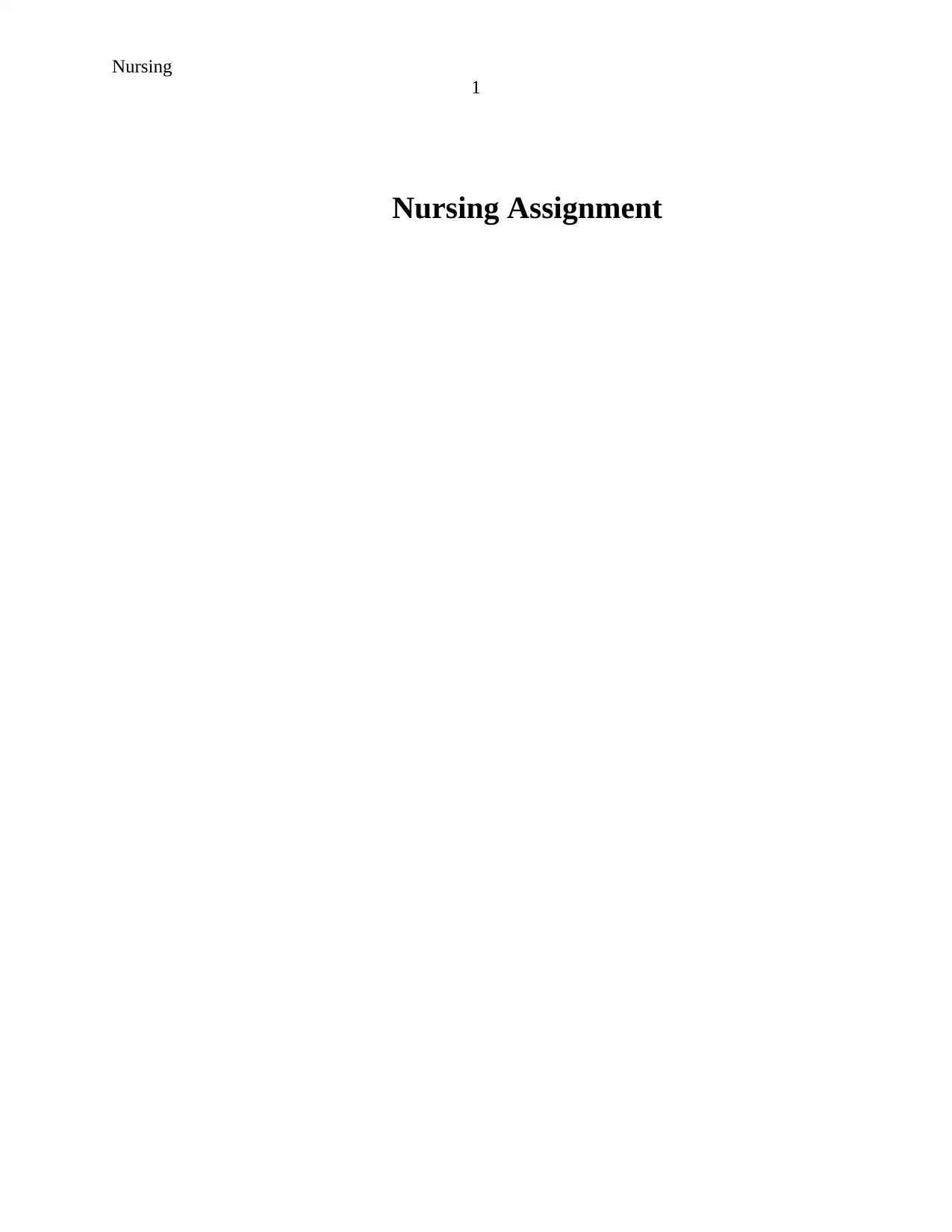
Nursing
1
Nursing Assignment
1
Nursing Assignment
Paraphrase This Document
Need a fresh take? Get an instant paraphrase of this document with our AI Paraphraser
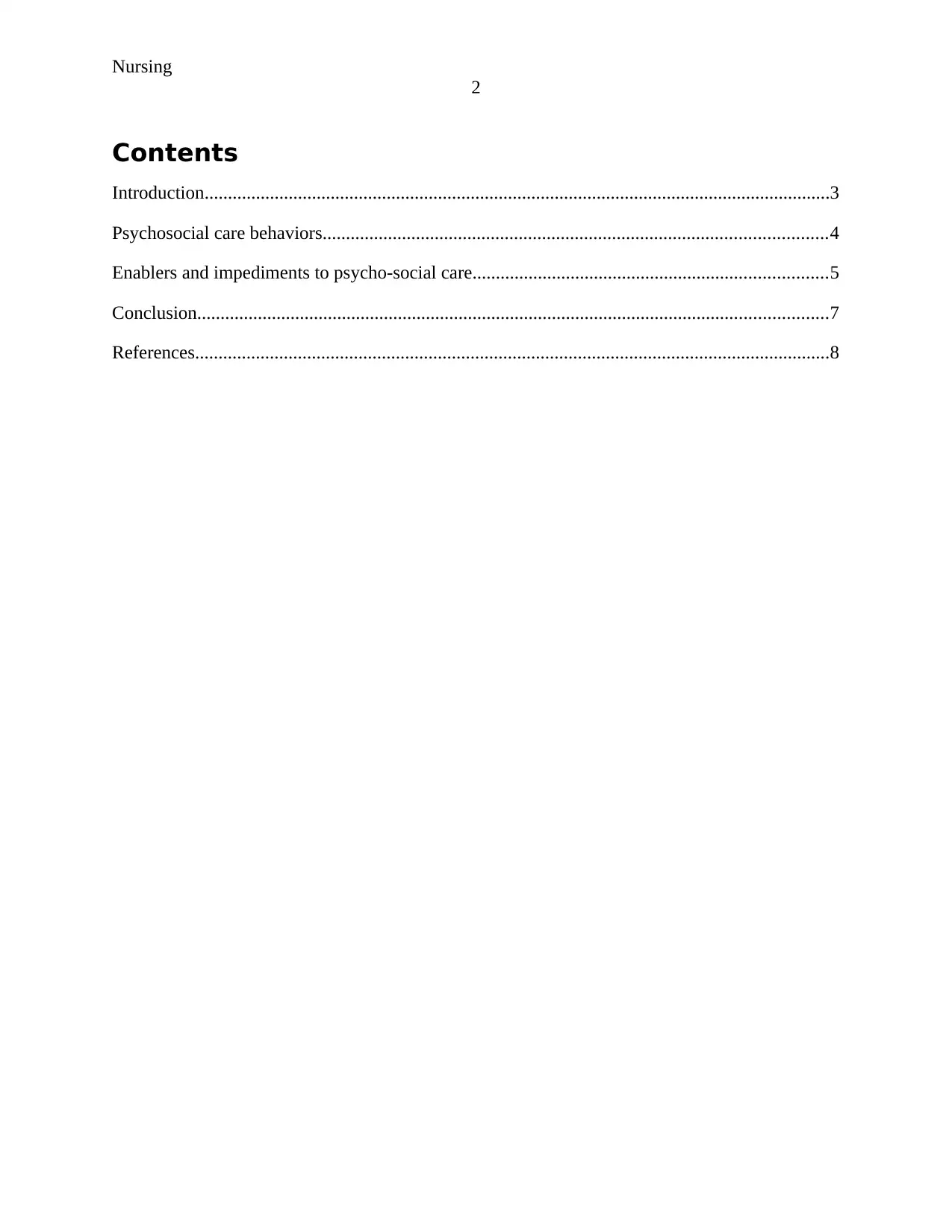
Nursing
2
Contents
Introduction......................................................................................................................................3
Psychosocial care behaviors............................................................................................................4
Enablers and impediments to psycho-social care............................................................................5
Conclusion.......................................................................................................................................7
References........................................................................................................................................8
2
Contents
Introduction......................................................................................................................................3
Psychosocial care behaviors............................................................................................................4
Enablers and impediments to psycho-social care............................................................................5
Conclusion.......................................................................................................................................7
References........................................................................................................................................8
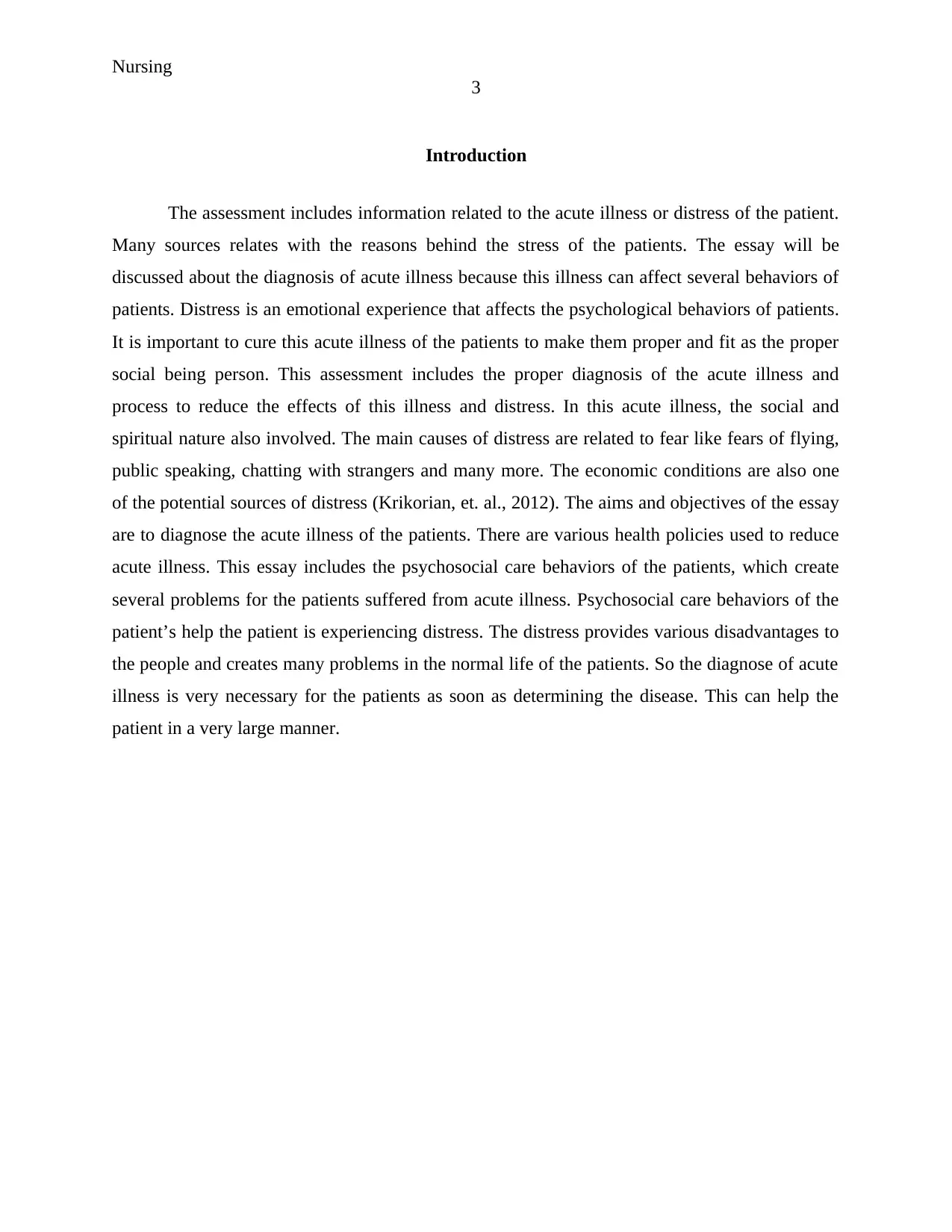
Nursing
3
Introduction
The assessment includes information related to the acute illness or distress of the patient.
Many sources relates with the reasons behind the stress of the patients. The essay will be
discussed about the diagnosis of acute illness because this illness can affect several behaviors of
patients. Distress is an emotional experience that affects the psychological behaviors of patients.
It is important to cure this acute illness of the patients to make them proper and fit as the proper
social being person. This assessment includes the proper diagnosis of the acute illness and
process to reduce the effects of this illness and distress. In this acute illness, the social and
spiritual nature also involved. The main causes of distress are related to fear like fears of flying,
public speaking, chatting with strangers and many more. The economic conditions are also one
of the potential sources of distress (Krikorian, et. al., 2012). The aims and objectives of the essay
are to diagnose the acute illness of the patients. There are various health policies used to reduce
acute illness. This essay includes the psychosocial care behaviors of the patients, which create
several problems for the patients suffered from acute illness. Psychosocial care behaviors of the
patient’s help the patient is experiencing distress. The distress provides various disadvantages to
the people and creates many problems in the normal life of the patients. So the diagnose of acute
illness is very necessary for the patients as soon as determining the disease. This can help the
patient in a very large manner.
3
Introduction
The assessment includes information related to the acute illness or distress of the patient.
Many sources relates with the reasons behind the stress of the patients. The essay will be
discussed about the diagnosis of acute illness because this illness can affect several behaviors of
patients. Distress is an emotional experience that affects the psychological behaviors of patients.
It is important to cure this acute illness of the patients to make them proper and fit as the proper
social being person. This assessment includes the proper diagnosis of the acute illness and
process to reduce the effects of this illness and distress. In this acute illness, the social and
spiritual nature also involved. The main causes of distress are related to fear like fears of flying,
public speaking, chatting with strangers and many more. The economic conditions are also one
of the potential sources of distress (Krikorian, et. al., 2012). The aims and objectives of the essay
are to diagnose the acute illness of the patients. There are various health policies used to reduce
acute illness. This essay includes the psychosocial care behaviors of the patients, which create
several problems for the patients suffered from acute illness. Psychosocial care behaviors of the
patient’s help the patient is experiencing distress. The distress provides various disadvantages to
the people and creates many problems in the normal life of the patients. So the diagnose of acute
illness is very necessary for the patients as soon as determining the disease. This can help the
patient in a very large manner.
⊘ This is a preview!⊘
Do you want full access?
Subscribe today to unlock all pages.

Trusted by 1+ million students worldwide
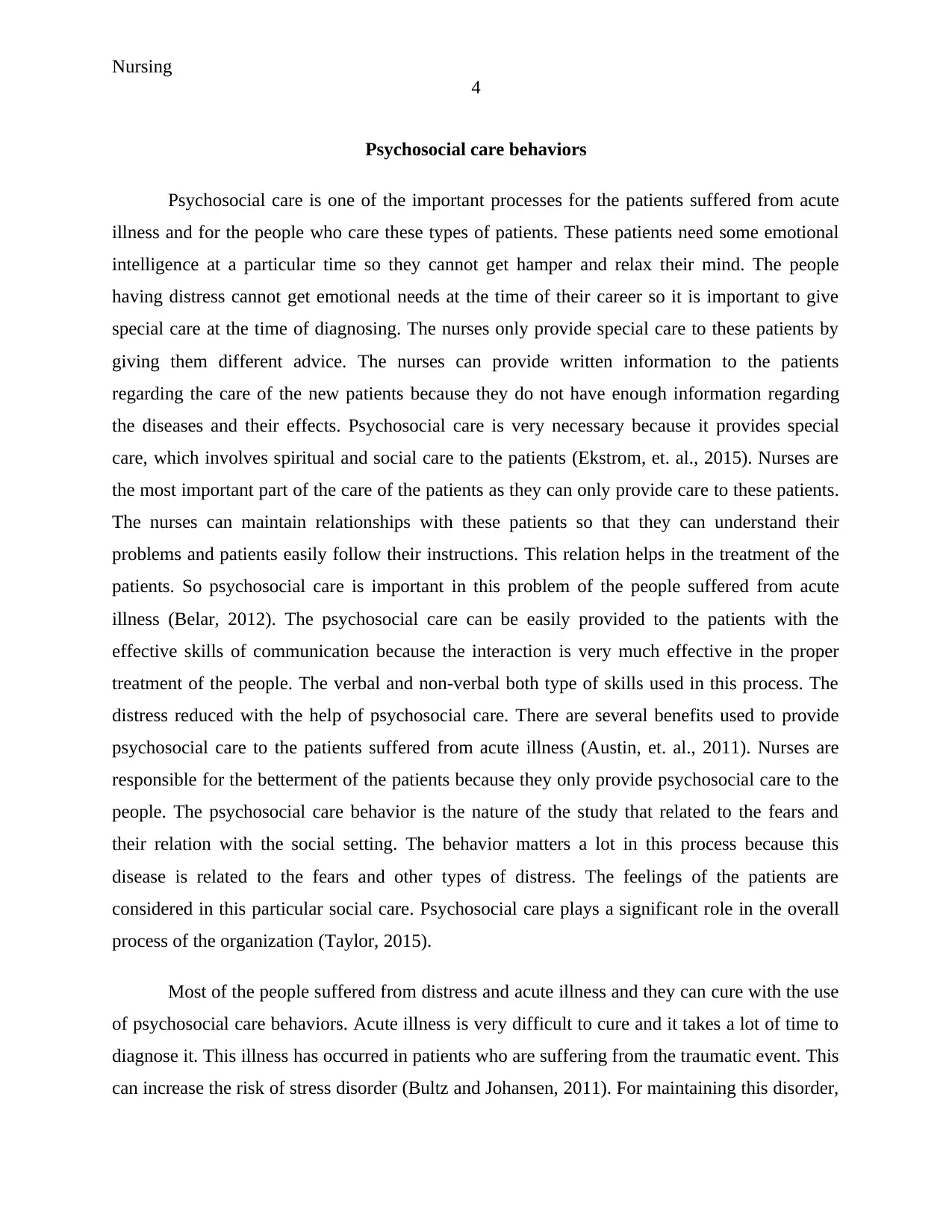
Nursing
4
Psychosocial care behaviors
Psychosocial care is one of the important processes for the patients suffered from acute
illness and for the people who care these types of patients. These patients need some emotional
intelligence at a particular time so they cannot get hamper and relax their mind. The people
having distress cannot get emotional needs at the time of their career so it is important to give
special care at the time of diagnosing. The nurses only provide special care to these patients by
giving them different advice. The nurses can provide written information to the patients
regarding the care of the new patients because they do not have enough information regarding
the diseases and their effects. Psychosocial care is very necessary because it provides special
care, which involves spiritual and social care to the patients (Ekstrom, et. al., 2015). Nurses are
the most important part of the care of the patients as they can only provide care to these patients.
The nurses can maintain relationships with these patients so that they can understand their
problems and patients easily follow their instructions. This relation helps in the treatment of the
patients. So psychosocial care is important in this problem of the people suffered from acute
illness (Belar, 2012). The psychosocial care can be easily provided to the patients with the
effective skills of communication because the interaction is very much effective in the proper
treatment of the people. The verbal and non-verbal both type of skills used in this process. The
distress reduced with the help of psychosocial care. There are several benefits used to provide
psychosocial care to the patients suffered from acute illness (Austin, et. al., 2011). Nurses are
responsible for the betterment of the patients because they only provide psychosocial care to the
people. The psychosocial care behavior is the nature of the study that related to the fears and
their relation with the social setting. The behavior matters a lot in this process because this
disease is related to the fears and other types of distress. The feelings of the patients are
considered in this particular social care. Psychosocial care plays a significant role in the overall
process of the organization (Taylor, 2015).
Most of the people suffered from distress and acute illness and they can cure with the use
of psychosocial care behaviors. Acute illness is very difficult to cure and it takes a lot of time to
diagnose it. This illness has occurred in patients who are suffering from the traumatic event. This
can increase the risk of stress disorder (Bultz and Johansen, 2011). For maintaining this disorder,
4
Psychosocial care behaviors
Psychosocial care is one of the important processes for the patients suffered from acute
illness and for the people who care these types of patients. These patients need some emotional
intelligence at a particular time so they cannot get hamper and relax their mind. The people
having distress cannot get emotional needs at the time of their career so it is important to give
special care at the time of diagnosing. The nurses only provide special care to these patients by
giving them different advice. The nurses can provide written information to the patients
regarding the care of the new patients because they do not have enough information regarding
the diseases and their effects. Psychosocial care is very necessary because it provides special
care, which involves spiritual and social care to the patients (Ekstrom, et. al., 2015). Nurses are
the most important part of the care of the patients as they can only provide care to these patients.
The nurses can maintain relationships with these patients so that they can understand their
problems and patients easily follow their instructions. This relation helps in the treatment of the
patients. So psychosocial care is important in this problem of the people suffered from acute
illness (Belar, 2012). The psychosocial care can be easily provided to the patients with the
effective skills of communication because the interaction is very much effective in the proper
treatment of the people. The verbal and non-verbal both type of skills used in this process. The
distress reduced with the help of psychosocial care. There are several benefits used to provide
psychosocial care to the patients suffered from acute illness (Austin, et. al., 2011). Nurses are
responsible for the betterment of the patients because they only provide psychosocial care to the
people. The psychosocial care behavior is the nature of the study that related to the fears and
their relation with the social setting. The behavior matters a lot in this process because this
disease is related to the fears and other types of distress. The feelings of the patients are
considered in this particular social care. Psychosocial care plays a significant role in the overall
process of the organization (Taylor, 2015).
Most of the people suffered from distress and acute illness and they can cure with the use
of psychosocial care behaviors. Acute illness is very difficult to cure and it takes a lot of time to
diagnose it. This illness has occurred in patients who are suffering from the traumatic event. This
can increase the risk of stress disorder (Bultz and Johansen, 2011). For maintaining this disorder,
Paraphrase This Document
Need a fresh take? Get an instant paraphrase of this document with our AI Paraphraser
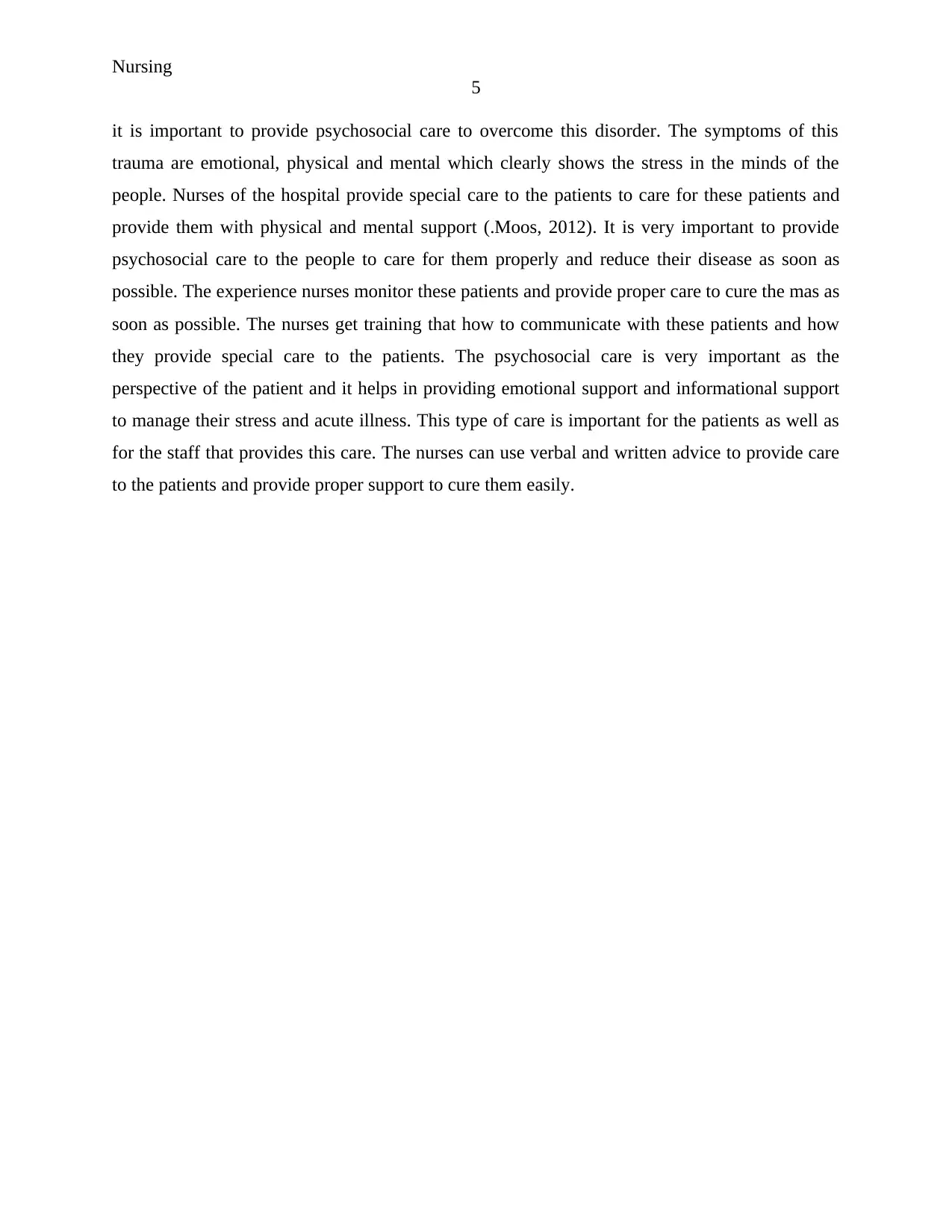
Nursing
5
it is important to provide psychosocial care to overcome this disorder. The symptoms of this
trauma are emotional, physical and mental which clearly shows the stress in the minds of the
people. Nurses of the hospital provide special care to the patients to care for these patients and
provide them with physical and mental support (.Moos, 2012). It is very important to provide
psychosocial care to the people to care for them properly and reduce their disease as soon as
possible. The experience nurses monitor these patients and provide proper care to cure the mas as
soon as possible. The nurses get training that how to communicate with these patients and how
they provide special care to the patients. The psychosocial care is very important as the
perspective of the patient and it helps in providing emotional support and informational support
to manage their stress and acute illness. This type of care is important for the patients as well as
for the staff that provides this care. The nurses can use verbal and written advice to provide care
to the patients and provide proper support to cure them easily.
5
it is important to provide psychosocial care to overcome this disorder. The symptoms of this
trauma are emotional, physical and mental which clearly shows the stress in the minds of the
people. Nurses of the hospital provide special care to the patients to care for these patients and
provide them with physical and mental support (.Moos, 2012). It is very important to provide
psychosocial care to the people to care for them properly and reduce their disease as soon as
possible. The experience nurses monitor these patients and provide proper care to cure the mas as
soon as possible. The nurses get training that how to communicate with these patients and how
they provide special care to the patients. The psychosocial care is very important as the
perspective of the patient and it helps in providing emotional support and informational support
to manage their stress and acute illness. This type of care is important for the patients as well as
for the staff that provides this care. The nurses can use verbal and written advice to provide care
to the patients and provide proper support to cure them easily.
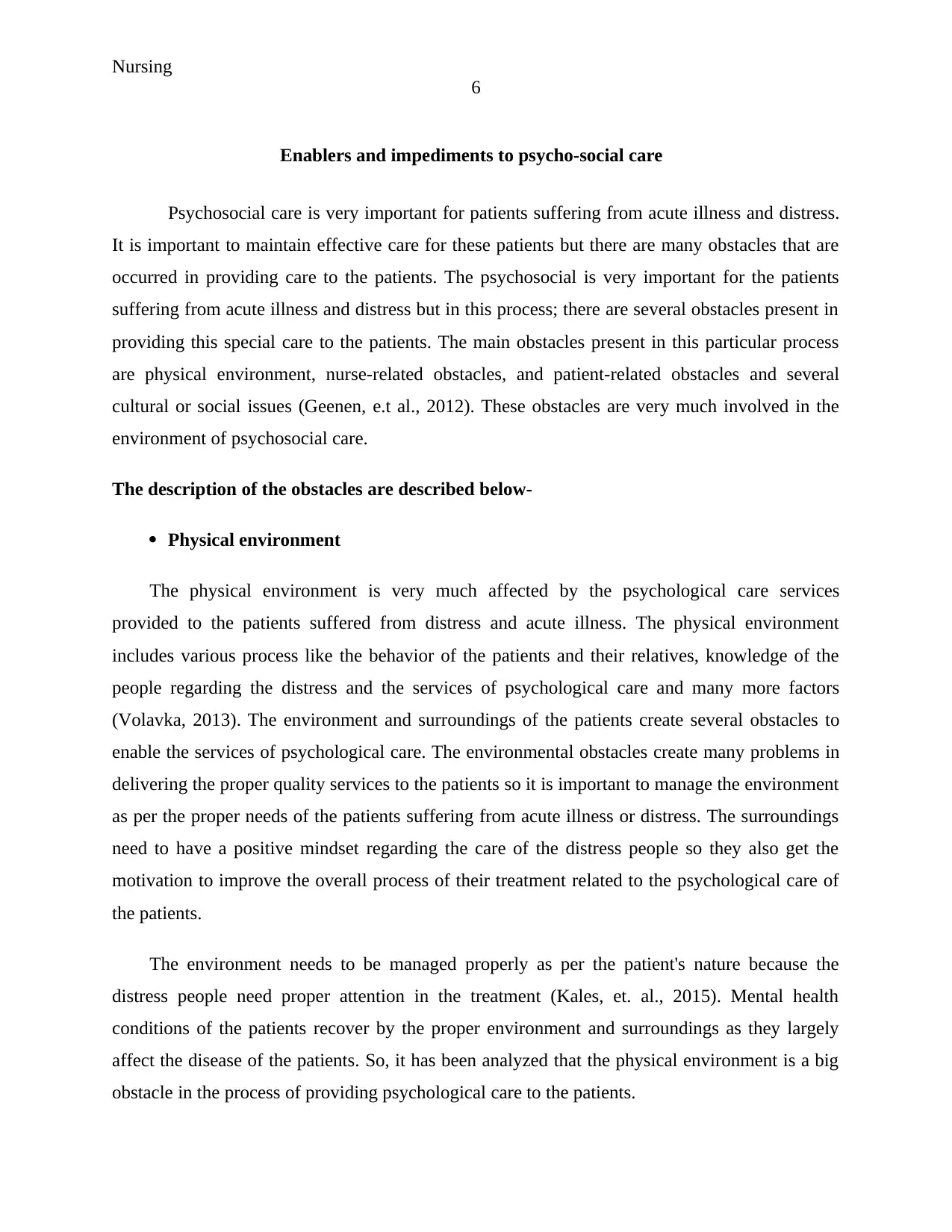
Nursing
6
Enablers and impediments to psycho-social care
Psychosocial care is very important for patients suffering from acute illness and distress.
It is important to maintain effective care for these patients but there are many obstacles that are
occurred in providing care to the patients. The psychosocial is very important for the patients
suffering from acute illness and distress but in this process; there are several obstacles present in
providing this special care to the patients. The main obstacles present in this particular process
are physical environment, nurse-related obstacles, and patient-related obstacles and several
cultural or social issues (Geenen, e.t al., 2012). These obstacles are very much involved in the
environment of psychosocial care.
The description of the obstacles are described below-
Physical environment
The physical environment is very much affected by the psychological care services
provided to the patients suffered from distress and acute illness. The physical environment
includes various process like the behavior of the patients and their relatives, knowledge of the
people regarding the distress and the services of psychological care and many more factors
(Volavka, 2013). The environment and surroundings of the patients create several obstacles to
enable the services of psychological care. The environmental obstacles create many problems in
delivering the proper quality services to the patients so it is important to manage the environment
as per the proper needs of the patients suffering from acute illness or distress. The surroundings
need to have a positive mindset regarding the care of the distress people so they also get the
motivation to improve the overall process of their treatment related to the psychological care of
the patients.
The environment needs to be managed properly as per the patient's nature because the
distress people need proper attention in the treatment (Kales, et. al., 2015). Mental health
conditions of the patients recover by the proper environment and surroundings as they largely
affect the disease of the patients. So, it has been analyzed that the physical environment is a big
obstacle in the process of providing psychological care to the patients.
6
Enablers and impediments to psycho-social care
Psychosocial care is very important for patients suffering from acute illness and distress.
It is important to maintain effective care for these patients but there are many obstacles that are
occurred in providing care to the patients. The psychosocial is very important for the patients
suffering from acute illness and distress but in this process; there are several obstacles present in
providing this special care to the patients. The main obstacles present in this particular process
are physical environment, nurse-related obstacles, and patient-related obstacles and several
cultural or social issues (Geenen, e.t al., 2012). These obstacles are very much involved in the
environment of psychosocial care.
The description of the obstacles are described below-
Physical environment
The physical environment is very much affected by the psychological care services
provided to the patients suffered from distress and acute illness. The physical environment
includes various process like the behavior of the patients and their relatives, knowledge of the
people regarding the distress and the services of psychological care and many more factors
(Volavka, 2013). The environment and surroundings of the patients create several obstacles to
enable the services of psychological care. The environmental obstacles create many problems in
delivering the proper quality services to the patients so it is important to manage the environment
as per the proper needs of the patients suffering from acute illness or distress. The surroundings
need to have a positive mindset regarding the care of the distress people so they also get the
motivation to improve the overall process of their treatment related to the psychological care of
the patients.
The environment needs to be managed properly as per the patient's nature because the
distress people need proper attention in the treatment (Kales, et. al., 2015). Mental health
conditions of the patients recover by the proper environment and surroundings as they largely
affect the disease of the patients. So, it has been analyzed that the physical environment is a big
obstacle in the process of providing psychological care to the patients.
⊘ This is a preview!⊘
Do you want full access?
Subscribe today to unlock all pages.

Trusted by 1+ million students worldwide
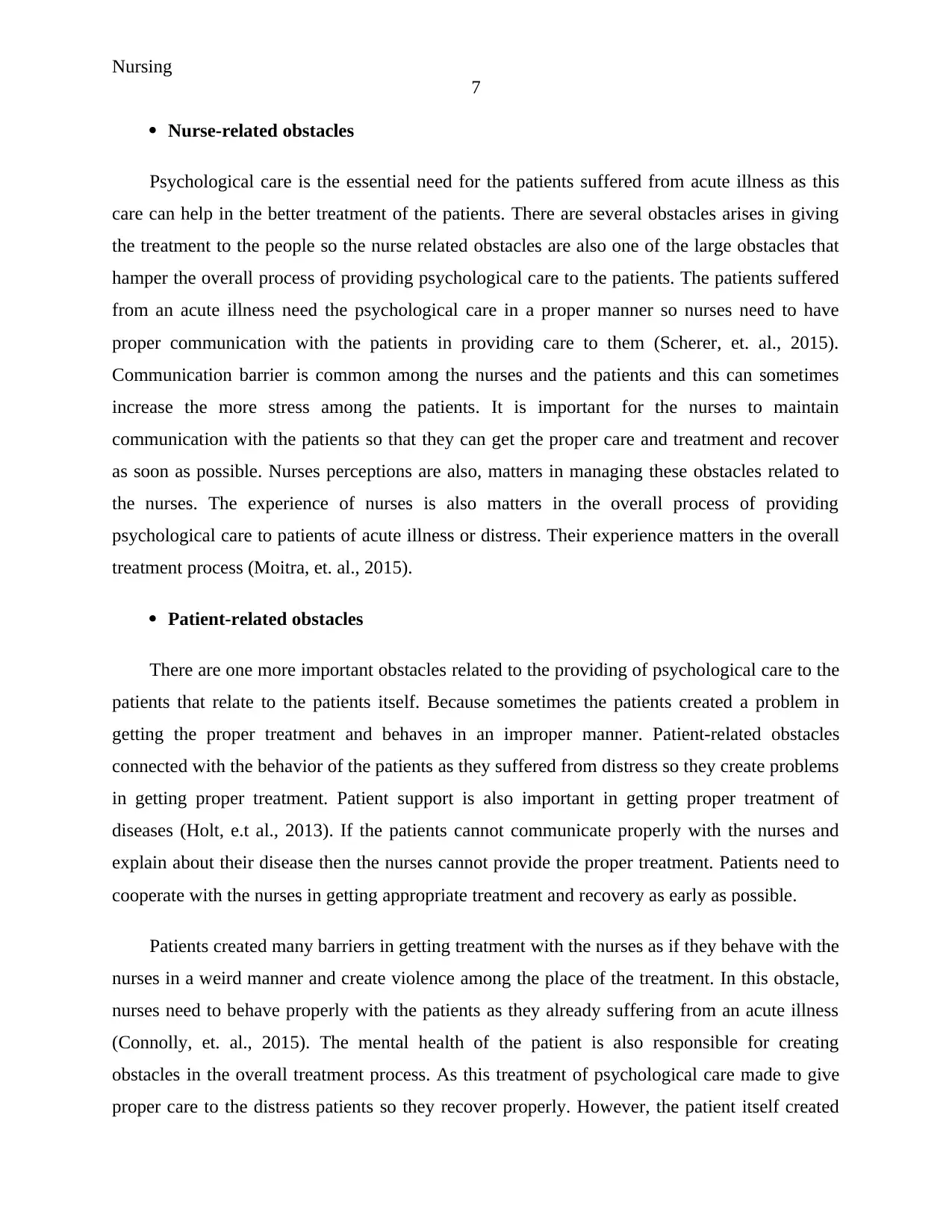
Nursing
7
Nurse-related obstacles
Psychological care is the essential need for the patients suffered from acute illness as this
care can help in the better treatment of the patients. There are several obstacles arises in giving
the treatment to the people so the nurse related obstacles are also one of the large obstacles that
hamper the overall process of providing psychological care to the patients. The patients suffered
from an acute illness need the psychological care in a proper manner so nurses need to have
proper communication with the patients in providing care to them (Scherer, et. al., 2015).
Communication barrier is common among the nurses and the patients and this can sometimes
increase the more stress among the patients. It is important for the nurses to maintain
communication with the patients so that they can get the proper care and treatment and recover
as soon as possible. Nurses perceptions are also, matters in managing these obstacles related to
the nurses. The experience of nurses is also matters in the overall process of providing
psychological care to patients of acute illness or distress. Their experience matters in the overall
treatment process (Moitra, et. al., 2015).
Patient-related obstacles
There are one more important obstacles related to the providing of psychological care to the
patients that relate to the patients itself. Because sometimes the patients created a problem in
getting the proper treatment and behaves in an improper manner. Patient-related obstacles
connected with the behavior of the patients as they suffered from distress so they create problems
in getting proper treatment. Patient support is also important in getting proper treatment of
diseases (Holt, e.t al., 2013). If the patients cannot communicate properly with the nurses and
explain about their disease then the nurses cannot provide the proper treatment. Patients need to
cooperate with the nurses in getting appropriate treatment and recovery as early as possible.
Patients created many barriers in getting treatment with the nurses as if they behave with the
nurses in a weird manner and create violence among the place of the treatment. In this obstacle,
nurses need to behave properly with the patients as they already suffering from an acute illness
(Connolly, et. al., 2015). The mental health of the patient is also responsible for creating
obstacles in the overall treatment process. As this treatment of psychological care made to give
proper care to the distress patients so they recover properly. However, the patient itself created
7
Nurse-related obstacles
Psychological care is the essential need for the patients suffered from acute illness as this
care can help in the better treatment of the patients. There are several obstacles arises in giving
the treatment to the people so the nurse related obstacles are also one of the large obstacles that
hamper the overall process of providing psychological care to the patients. The patients suffered
from an acute illness need the psychological care in a proper manner so nurses need to have
proper communication with the patients in providing care to them (Scherer, et. al., 2015).
Communication barrier is common among the nurses and the patients and this can sometimes
increase the more stress among the patients. It is important for the nurses to maintain
communication with the patients so that they can get the proper care and treatment and recover
as soon as possible. Nurses perceptions are also, matters in managing these obstacles related to
the nurses. The experience of nurses is also matters in the overall process of providing
psychological care to patients of acute illness or distress. Their experience matters in the overall
treatment process (Moitra, et. al., 2015).
Patient-related obstacles
There are one more important obstacles related to the providing of psychological care to the
patients that relate to the patients itself. Because sometimes the patients created a problem in
getting the proper treatment and behaves in an improper manner. Patient-related obstacles
connected with the behavior of the patients as they suffered from distress so they create problems
in getting proper treatment. Patient support is also important in getting proper treatment of
diseases (Holt, e.t al., 2013). If the patients cannot communicate properly with the nurses and
explain about their disease then the nurses cannot provide the proper treatment. Patients need to
cooperate with the nurses in getting appropriate treatment and recovery as early as possible.
Patients created many barriers in getting treatment with the nurses as if they behave with the
nurses in a weird manner and create violence among the place of the treatment. In this obstacle,
nurses need to behave properly with the patients as they already suffering from an acute illness
(Connolly, et. al., 2015). The mental health of the patient is also responsible for creating
obstacles in the overall treatment process. As this treatment of psychological care made to give
proper care to the distress patients so they recover properly. However, the patient itself created
Paraphrase This Document
Need a fresh take? Get an instant paraphrase of this document with our AI Paraphraser
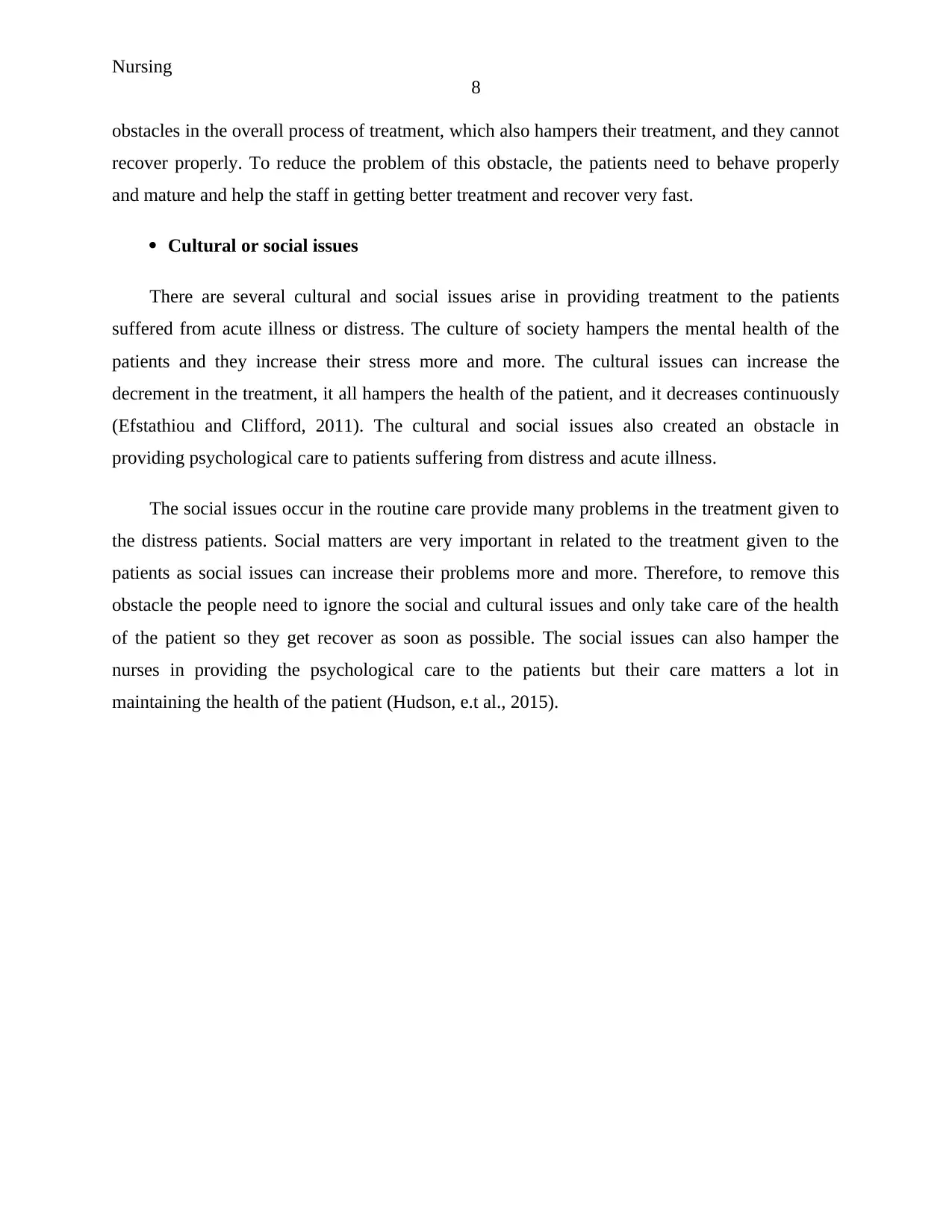
Nursing
8
obstacles in the overall process of treatment, which also hampers their treatment, and they cannot
recover properly. To reduce the problem of this obstacle, the patients need to behave properly
and mature and help the staff in getting better treatment and recover very fast.
Cultural or social issues
There are several cultural and social issues arise in providing treatment to the patients
suffered from acute illness or distress. The culture of society hampers the mental health of the
patients and they increase their stress more and more. The cultural issues can increase the
decrement in the treatment, it all hampers the health of the patient, and it decreases continuously
(Efstathiou and Clifford, 2011). The cultural and social issues also created an obstacle in
providing psychological care to patients suffering from distress and acute illness.
The social issues occur in the routine care provide many problems in the treatment given to
the distress patients. Social matters are very important in related to the treatment given to the
patients as social issues can increase their problems more and more. Therefore, to remove this
obstacle the people need to ignore the social and cultural issues and only take care of the health
of the patient so they get recover as soon as possible. The social issues can also hamper the
nurses in providing the psychological care to the patients but their care matters a lot in
maintaining the health of the patient (Hudson, e.t al., 2015).
8
obstacles in the overall process of treatment, which also hampers their treatment, and they cannot
recover properly. To reduce the problem of this obstacle, the patients need to behave properly
and mature and help the staff in getting better treatment and recover very fast.
Cultural or social issues
There are several cultural and social issues arise in providing treatment to the patients
suffered from acute illness or distress. The culture of society hampers the mental health of the
patients and they increase their stress more and more. The cultural issues can increase the
decrement in the treatment, it all hampers the health of the patient, and it decreases continuously
(Efstathiou and Clifford, 2011). The cultural and social issues also created an obstacle in
providing psychological care to patients suffering from distress and acute illness.
The social issues occur in the routine care provide many problems in the treatment given to
the distress patients. Social matters are very important in related to the treatment given to the
patients as social issues can increase their problems more and more. Therefore, to remove this
obstacle the people need to ignore the social and cultural issues and only take care of the health
of the patient so they get recover as soon as possible. The social issues can also hamper the
nurses in providing the psychological care to the patients but their care matters a lot in
maintaining the health of the patient (Hudson, e.t al., 2015).
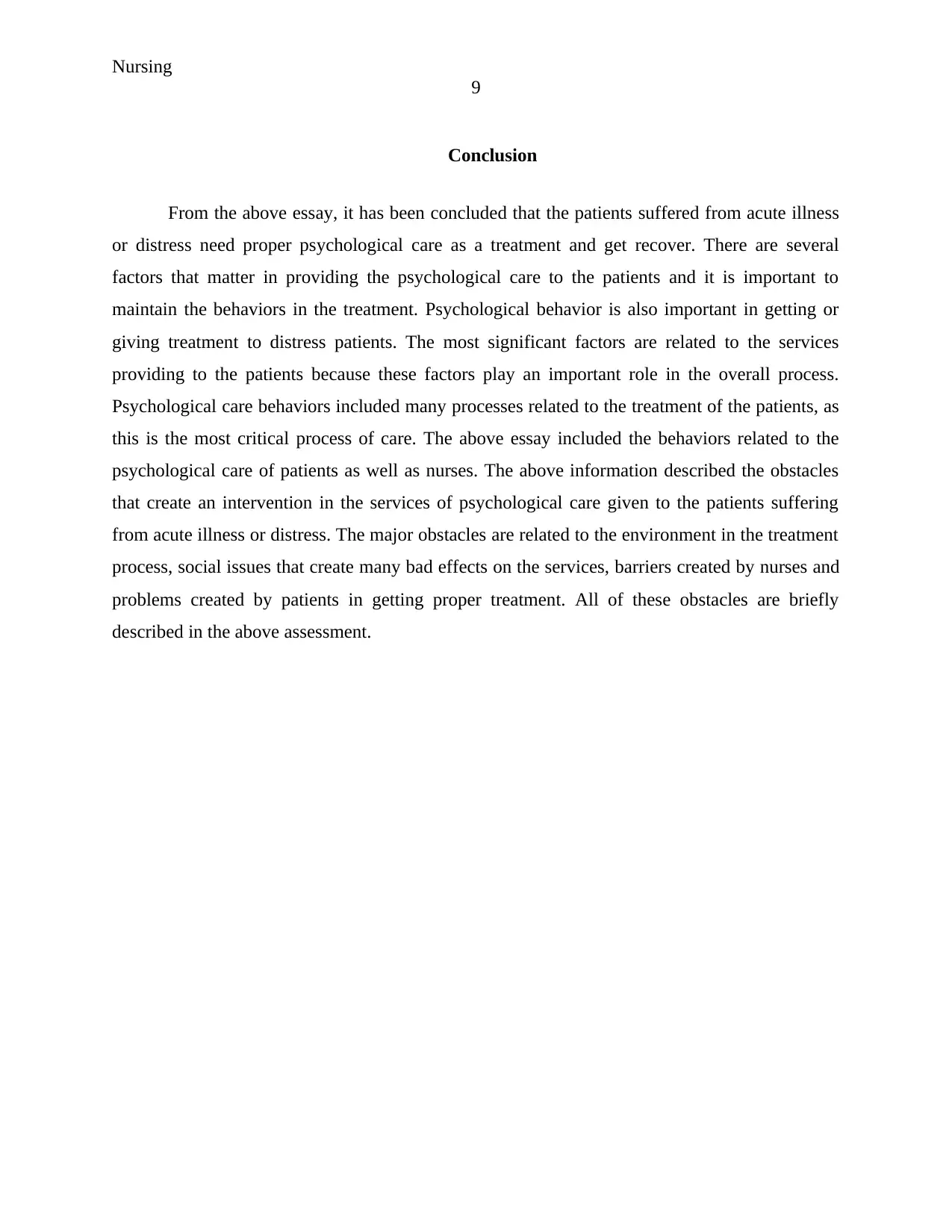
Nursing
9
Conclusion
From the above essay, it has been concluded that the patients suffered from acute illness
or distress need proper psychological care as a treatment and get recover. There are several
factors that matter in providing the psychological care to the patients and it is important to
maintain the behaviors in the treatment. Psychological behavior is also important in getting or
giving treatment to distress patients. The most significant factors are related to the services
providing to the patients because these factors play an important role in the overall process.
Psychological care behaviors included many processes related to the treatment of the patients, as
this is the most critical process of care. The above essay included the behaviors related to the
psychological care of patients as well as nurses. The above information described the obstacles
that create an intervention in the services of psychological care given to the patients suffering
from acute illness or distress. The major obstacles are related to the environment in the treatment
process, social issues that create many bad effects on the services, barriers created by nurses and
problems created by patients in getting proper treatment. All of these obstacles are briefly
described in the above assessment.
9
Conclusion
From the above essay, it has been concluded that the patients suffered from acute illness
or distress need proper psychological care as a treatment and get recover. There are several
factors that matter in providing the psychological care to the patients and it is important to
maintain the behaviors in the treatment. Psychological behavior is also important in getting or
giving treatment to distress patients. The most significant factors are related to the services
providing to the patients because these factors play an important role in the overall process.
Psychological care behaviors included many processes related to the treatment of the patients, as
this is the most critical process of care. The above essay included the behaviors related to the
psychological care of patients as well as nurses. The above information described the obstacles
that create an intervention in the services of psychological care given to the patients suffering
from acute illness or distress. The major obstacles are related to the environment in the treatment
process, social issues that create many bad effects on the services, barriers created by nurses and
problems created by patients in getting proper treatment. All of these obstacles are briefly
described in the above assessment.
⊘ This is a preview!⊘
Do you want full access?
Subscribe today to unlock all pages.

Trusted by 1+ million students worldwide
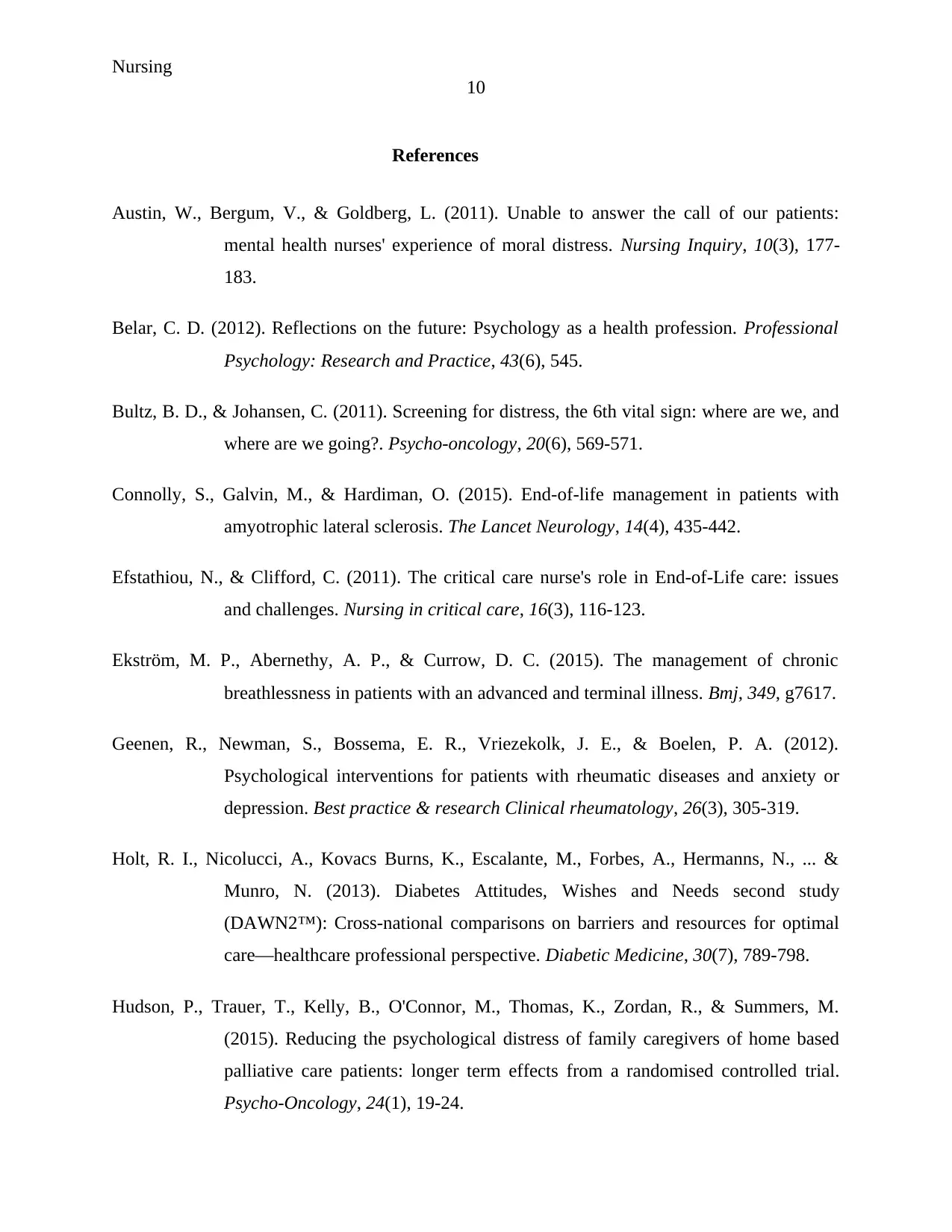
Nursing
10
References
Austin, W., Bergum, V., & Goldberg, L. (2011). Unable to answer the call of our patients:
mental health nurses' experience of moral distress. Nursing Inquiry, 10(3), 177-
183.
Belar, C. D. (2012). Reflections on the future: Psychology as a health profession. Professional
Psychology: Research and Practice, 43(6), 545.
Bultz, B. D., & Johansen, C. (2011). Screening for distress, the 6th vital sign: where are we, and
where are we going?. Psycho‐oncology, 20(6), 569-571.
Connolly, S., Galvin, M., & Hardiman, O. (2015). End-of-life management in patients with
amyotrophic lateral sclerosis. The Lancet Neurology, 14(4), 435-442.
Efstathiou, N., & Clifford, C. (2011). The critical care nurse's role in End‐of‐Life care: issues
and challenges. Nursing in critical care, 16(3), 116-123.
Ekström, M. P., Abernethy, A. P., & Currow, D. C. (2015). The management of chronic
breathlessness in patients with an advanced and terminal illness. Bmj, 349, g7617.
Geenen, R., Newman, S., Bossema, E. R., Vriezekolk, J. E., & Boelen, P. A. (2012).
Psychological interventions for patients with rheumatic diseases and anxiety or
depression. Best practice & research Clinical rheumatology, 26(3), 305-319.
Holt, R. I., Nicolucci, A., Kovacs Burns, K., Escalante, M., Forbes, A., Hermanns, N., ... &
Munro, N. (2013). Diabetes Attitudes, Wishes and Needs second study
(DAWN2™): Cross‐national comparisons on barriers and resources for optimal
care—healthcare professional perspective. Diabetic Medicine, 30(7), 789-798.
Hudson, P., Trauer, T., Kelly, B., O'Connor, M., Thomas, K., Zordan, R., & Summers, M.
(2015). Reducing the psychological distress of family caregivers of home based
palliative care patients: longer term effects from a randomised controlled trial.
Psycho‐Oncology, 24(1), 19-24.
10
References
Austin, W., Bergum, V., & Goldberg, L. (2011). Unable to answer the call of our patients:
mental health nurses' experience of moral distress. Nursing Inquiry, 10(3), 177-
183.
Belar, C. D. (2012). Reflections on the future: Psychology as a health profession. Professional
Psychology: Research and Practice, 43(6), 545.
Bultz, B. D., & Johansen, C. (2011). Screening for distress, the 6th vital sign: where are we, and
where are we going?. Psycho‐oncology, 20(6), 569-571.
Connolly, S., Galvin, M., & Hardiman, O. (2015). End-of-life management in patients with
amyotrophic lateral sclerosis. The Lancet Neurology, 14(4), 435-442.
Efstathiou, N., & Clifford, C. (2011). The critical care nurse's role in End‐of‐Life care: issues
and challenges. Nursing in critical care, 16(3), 116-123.
Ekström, M. P., Abernethy, A. P., & Currow, D. C. (2015). The management of chronic
breathlessness in patients with an advanced and terminal illness. Bmj, 349, g7617.
Geenen, R., Newman, S., Bossema, E. R., Vriezekolk, J. E., & Boelen, P. A. (2012).
Psychological interventions for patients with rheumatic diseases and anxiety or
depression. Best practice & research Clinical rheumatology, 26(3), 305-319.
Holt, R. I., Nicolucci, A., Kovacs Burns, K., Escalante, M., Forbes, A., Hermanns, N., ... &
Munro, N. (2013). Diabetes Attitudes, Wishes and Needs second study
(DAWN2™): Cross‐national comparisons on barriers and resources for optimal
care—healthcare professional perspective. Diabetic Medicine, 30(7), 789-798.
Hudson, P., Trauer, T., Kelly, B., O'Connor, M., Thomas, K., Zordan, R., & Summers, M.
(2015). Reducing the psychological distress of family caregivers of home based
palliative care patients: longer term effects from a randomised controlled trial.
Psycho‐Oncology, 24(1), 19-24.
Paraphrase This Document
Need a fresh take? Get an instant paraphrase of this document with our AI Paraphraser
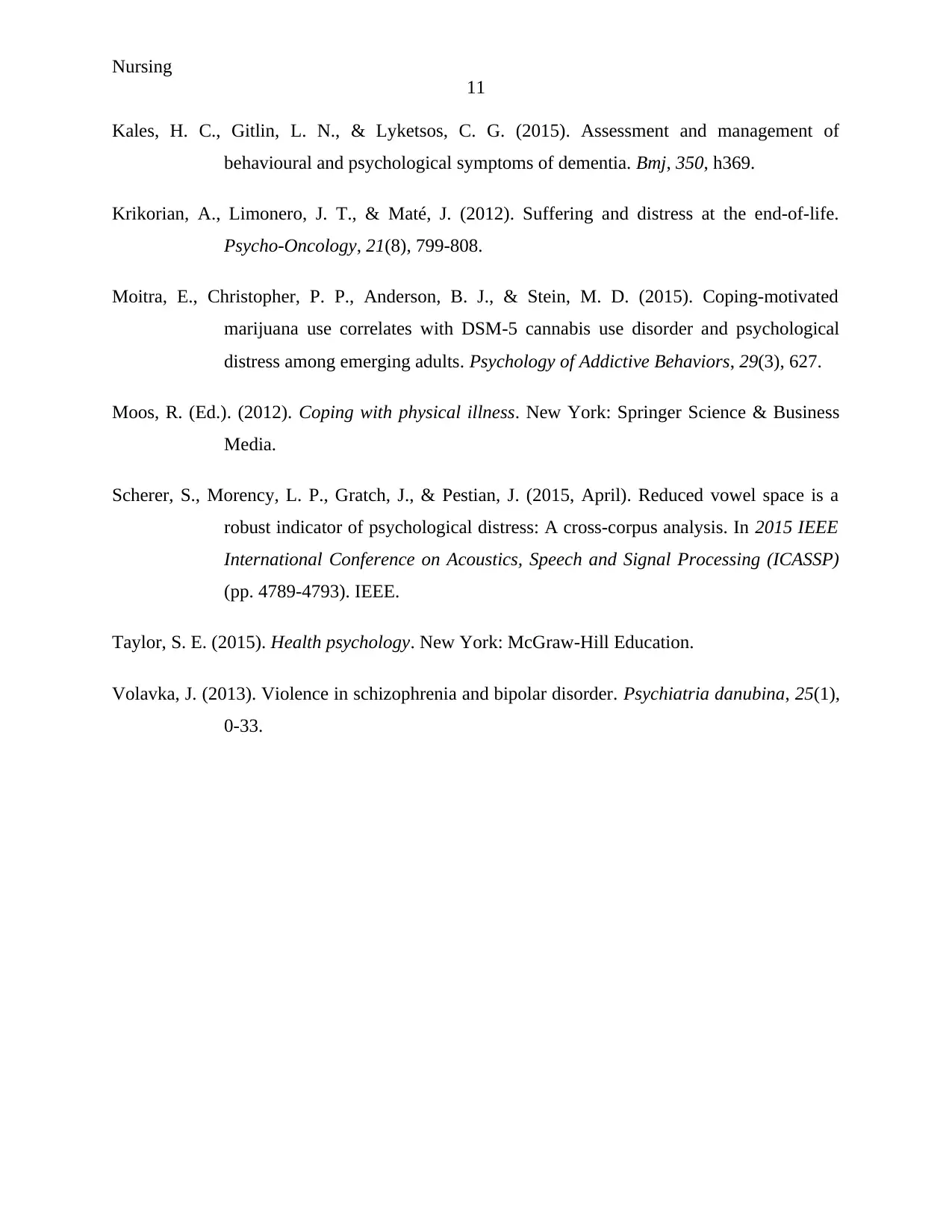
Nursing
11
Kales, H. C., Gitlin, L. N., & Lyketsos, C. G. (2015). Assessment and management of
behavioural and psychological symptoms of dementia. Bmj, 350, h369.
Krikorian, A., Limonero, J. T., & Maté, J. (2012). Suffering and distress at the end‐of‐life.
Psycho‐Oncology, 21(8), 799-808.
Moitra, E., Christopher, P. P., Anderson, B. J., & Stein, M. D. (2015). Coping-motivated
marijuana use correlates with DSM-5 cannabis use disorder and psychological
distress among emerging adults. Psychology of Addictive Behaviors, 29(3), 627.
Moos, R. (Ed.). (2012). Coping with physical illness. New York: Springer Science & Business
Media.
Scherer, S., Morency, L. P., Gratch, J., & Pestian, J. (2015, April). Reduced vowel space is a
robust indicator of psychological distress: A cross-corpus analysis. In 2015 IEEE
International Conference on Acoustics, Speech and Signal Processing (ICASSP)
(pp. 4789-4793). IEEE.
Taylor, S. E. (2015). Health psychology. New York: McGraw-Hill Education.
Volavka, J. (2013). Violence in schizophrenia and bipolar disorder. Psychiatria danubina, 25(1),
0-33.
11
Kales, H. C., Gitlin, L. N., & Lyketsos, C. G. (2015). Assessment and management of
behavioural and psychological symptoms of dementia. Bmj, 350, h369.
Krikorian, A., Limonero, J. T., & Maté, J. (2012). Suffering and distress at the end‐of‐life.
Psycho‐Oncology, 21(8), 799-808.
Moitra, E., Christopher, P. P., Anderson, B. J., & Stein, M. D. (2015). Coping-motivated
marijuana use correlates with DSM-5 cannabis use disorder and psychological
distress among emerging adults. Psychology of Addictive Behaviors, 29(3), 627.
Moos, R. (Ed.). (2012). Coping with physical illness. New York: Springer Science & Business
Media.
Scherer, S., Morency, L. P., Gratch, J., & Pestian, J. (2015, April). Reduced vowel space is a
robust indicator of psychological distress: A cross-corpus analysis. In 2015 IEEE
International Conference on Acoustics, Speech and Signal Processing (ICASSP)
(pp. 4789-4793). IEEE.
Taylor, S. E. (2015). Health psychology. New York: McGraw-Hill Education.
Volavka, J. (2013). Violence in schizophrenia and bipolar disorder. Psychiatria danubina, 25(1),
0-33.
1 out of 11
Related Documents
Your All-in-One AI-Powered Toolkit for Academic Success.
+13062052269
info@desklib.com
Available 24*7 on WhatsApp / Email
![[object Object]](/_next/static/media/star-bottom.7253800d.svg)
Unlock your academic potential
Copyright © 2020–2026 A2Z Services. All Rights Reserved. Developed and managed by ZUCOL.





